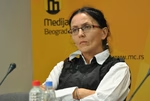Presidency Chairman to Swedish Academy: Visit Srebrenica before awarding Handke

The Chairman of Bosnia’s Presidency has joined on Tuesday the chorus of critics of the decision to award writer Peter Handke with the Nobel Prize for Literature.
Oglas
In his letter to the Swedish Academy which awarded the Austrian playwright, novelist and poet on Thursday, Zeljko Komsic expressed his disappointment with the choice, saying the Committee for Literature should have considered Handke’s entire social engagement in the decision-making process.
Handke was close to former Serb leader Slobodan Milosevic, visited him in his cell in The Netherlands during his war crimes trial and held a speech at his funeral in Serbia.
The writer denied the Serb massacre of more than 8,000 Muslim men in Srebrenica and spoke about Serbia as the victim of the recent wars in former Yugoslavia.
Oglas
“The moral characteristics of any Nobel Prize candidate can not be viewed separately from their scientific or literary works,” Komsic wrote.
Handke is not only known as a writer but also as a denier of the Srebrenica genocide and the crimes against humanity that have been committed in Bosnia, the letter said. “Moreover, Handke has been particularly prominent in glorifying war crimes and war criminals convicted by the International Court in The Hague (ICTY)."
By awarding Peter Handke, the Academy is risking future candidates rejecting this Prize in order to avoid being associated with someone who glorifies genocide, the Presidency Chairman wrote.
“It is clear that the non-literary values Handke advertised completely contradict the Nobel values, moral principles and humanistic views of Alfred Nobel,” his letter said, adding that the Committee is risking being labelled as a contributor to the glorification of the Bosnian genocide at a time when the wounds inflicted by those hailed by Handke are still healing.
Oglas
“Before you hand out the prize, I am inviting you to visit Srebrenica and other cities in Bosnia and Herzegovina where the non-literary idols of Peter Handke have committed genocide and crimes against humanity and to reconsider your decision after you speak to the victims,” Komsic wrote.
Kakvo je tvoje mišljenje o ovome?
Učestvuj u diskusiji ili pročitaj komentare
Oglas
Kakvo je tvoje mišljenje o ovome?
Učestvuj u diskusiji ili pročitaj komentare
Oglas





 Srbija
Srbija
 Hrvatska
Hrvatska
 Slovenija
Slovenija


























































